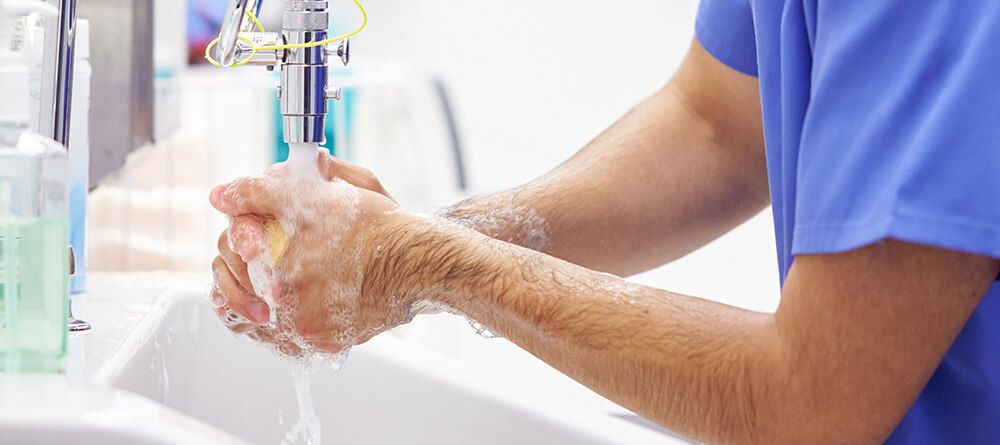As you think about choosing a medical school, you’re thinking about how to set yourself up for long term-success. It’s not just about where you study but also where you’ll live and practice after your studies. You’re inevitably thinking about what life after medical school could look like, so as you research the School of Medicine at St. George’s University (SGU), we’re giving you a sneak peek.
To give you a sense of what SGU graduates do after completing their education, we’re highlighting eight different stories. Take a look at the impact these alumni are making all across the US.
8 SGU grads making an impact across the United States
Many aspiring medical students want to confirm their ability to practice back home after attending an international medical school. For these medical school candidates, SGU has good news. Over the past three years, graduates have recorded a 93 percent US residency placement1
In fact, SGU is the largest source of actively licensed physicians in the entire US workforce.2 Keep reading to learn about eight of those accomplished alumni who made their way back home to practice in the US.
1. Leading tomorrow’s family physicians in Arizona
Educating young minds has always been a passion for Dr. Margaret Russell, who spent more than 20 years as a teacher before attending medical school. So what led to the drastic career change? Dr. Russell saw the consequences of inadequate health care when a neighbor’s young child died of pneumonia.
“I thought to myself, ‘I am going to fix this situation. I am going to be a doctor in a rural town that needs me,’” she recalls.
Dr. Russell practiced rural medicine for several years before relocating to a more urban environment to practice family medicine. Her medical school education helped her in both settings.
“I depend on the skills I was taught at SGU, and those skills have never let me down.”
Dr. Russell practiced rural medicine for several years before relocating to a more urban environment to practice family medicine. Her medical school education helped her in both settings.
“St. George’s had us use all of our senses right off the bat,” she says. “I depend on the skills I was taught at SGU, and those skills have never let me down.”
2. Managing emergencies in Texas
When most people talk about returning home, they’re usually referring to their home state or city. Dr. Jessica Best, the education committee chair at the Texas College of Emergency Physicians, took it one step further. She actually completed her residency at the same hospital where she was born.
Dr. Best’s journey has been filled with adventure. She kicked off her medical education in England by participating in the St. George’s University Of Grenada School Of Medicine/Northumbria University Four- and Five-Year MD Program, moved to Grenada, and also pursued an elective in Thailand. Even after graduating, Dr. Best continued to gain global health experience by spending a month treating patients in Malawi in Indonesia. “The experience was extremely rewarding,” she says.
Her fearless attitude still proves useful. “In the ER, it can be something very benign to something that requires the entire department to resuscitate,” Dr. Best explains. “You have to come to work to be ready for just about anything, and I think that’s what’s really exciting.”

3. Changing lives in California
A dedication to education has guided Dr. Sepehr Lalezari since childhood. He moved from Iran to California when he was four years old, where he was heavily influenced by a teacher who helped him overcome his early struggles to learn English. Later, Dr. Lalezari would get to be the one in the teaching seat when he served as a general surgery instructor at Johns Hopkins Medicine—the same place he completed a fellowship in bariatric and minimally invasive surgery.
Now based in Los Angeles, California, Dr. Lalezari operates a practice where he is able to significantly impact people’s lives.
“The faculty, staff, and people in Grenada were great,” he reflects. “It’s a great place to learn, and the education I received set me up to be successful.”
Dr. Lalezari decided to attend St. George’s after hearing positive feedback from others who had gone through the program. He soon learned why they felt that way. “The faculty, staff, and people in Grenada were great,” he reflects. “It’s a great place to learn, and the education I received set me up to be successful.”
4. Guiding patients through procedures in Missouri
Returning to the Midwest was Dr. Tanner Brownrigg’s plan before he even set foot in Grenada. He also knew he wanted to practice anesthesiology. Dr. Brownrigg was drawn to the field since he knew it would allow him to work very closely with patients—his role starts with a thorough preoperative evaluation then continues during and after procedures.
“Once we get into the operating room, I monitor the patient throughout the operation and am able to respond to acute changes that may take place during the surgery,” Dr. Brownrigg explains. “Then in the post-anesthesia care unit (PACU), I help control the pain and make sure the patient is stable for discharge home or to the hospital floor.”

Now practicing with Ad Vivum Anesthesiology, PC, Dr. Brownrigg credits much of his success to the education he received at SGU. “The fact that I scored so well on the USMLE Step 1 and 2 exams was directly related to the quality of the professors at St. George’s and how the classes are structured,” he says.
5. Treating those close to home in New York
For Dr. Amanda Halstrom, securing a residency position near where she grew up in New York is just as exciting for her loved ones as it is for her. “My family is over the moon,” she says. “My grandparents, my cousins, my friends— they’re very excited to have me back.”
Of course, the internal medicine residency program at NYU Winthrop Hospital also has her smiling. In addition to primary care residency positions, the hospital offers numerous fellowship opportunities.
“SGU was an amazing experience that not everybody gets to have elsewhere, and I feel fortunate to have had the opportunity”
Dr. Halstrom believes St. George’s University helped set her a path to success. “SGU was an amazing experience that not everybody gets to have elsewhere, and I feel fortunate to have had the opportunity,” she says.
6. Devoting medical attention to digestive systems in Hawaii
It takes time for some to realize their passion for medicine. For example, Dr. Mel Ona pursued a degree in music before ultimately attending the School of Medicine at SGU. Although his path wasn’t exactly traditional, Dr. Ona is glad he found his way to gastroenterology.
“I like having the balance of medicine and procedures,” he says. “It gives you the opportunity to take care of patients in a multitude of ways.”
Dr. Ona is now a Gastroenterologist practicing in Hawaii, where he moved to be closer to his parents. He has also penned a few books that offer guidance for medical students. He sees it as his way of offering the same type of support he received at SGU. “It wasn’t all me; it was a team effort,” he explains.
7. Providing critical brain care in Pennsylvania
Dr. James Peoples was considering a career in surgery until Dr. Leon S. Wolfe, a visiting professor at SGU from the Montreal Neurological Institute, completely changed his perspective. “He introduced me to neurology, and I still have the notes I took from his class,” Dr. Peoples recalls.
“The people I was surrounded by were motivated to study,” he notes. “We saw it as an opportunity to get where we wanted professionally. I didn’t really have the distractions of home, and I definitely benefited from being away with a goal in mind.”
After completing a few internships, a residency, and a fellowship, Dr. Peoples became a neurointensivist. His dedication and passion certainly got him to where he is today. But Dr. Peoples also thinks SGU and his fellow classmates helped him along the way.
“The people I was surrounded by were motivated to study,” he notes. “We saw it as an opportunity to get where we wanted professionally. I didn’t really have the distractions of home, and I definitely benefited from being away with a goal in mind.”
8. Continuing a family tradition in New Jersey
Dr. Nadir Ahmad knew from a very early age that he wanted to follow in his father’s footsteps by pursuing otolaryngology. “My father was my main inspiration,” he says. “Then when I went to medical school at SGU and was exposed to head and neck anatomy and physiology, it solidified my career path even more.”
Now serving as the head of the division of otolaryngology at Cooper University Health Care, Dr. Ahmad is just as passionate about his career path as ever. “There is never a dull moment in our field,” he explains. “Head and neck anatomy is the most intricate anatomy in the entire body. It requires both finesse and skill to operate in this region, as there is very little margin for error.”
Dr. Ahmad is also playing his part to ensure future physicians receive great training. He’s worked to develop the clinical curriculum and now directs the otolaryngology residency program.

Now serving as the head of the division of otolaryngology at Cooper University Health Care, Dr. Ahmad is just as passionate about his career path as ever. “There is never a dull moment in our field,” he explains. “Head and neck anatomy is the most intricate anatomy in the entire body. It requires both finesse and skill to operate in this region, as there is very little margin for error.”
Dr. Ahmad is also playing his part to ensure future physicians receive great training. He’s worked to develop the clinical curriculum and now directs the otolaryngology residency program.
Where will you make your impact?
No matter where you call home, it’s likely there are some nearby doctors who’ve built their careers on the education they received at St. George’s University. It just takes a quick glance over SGU’s past residency placements to see how much of an impact alumni are having all across the US.
Joining the SGU community could provide you with similar opportunities. To learn more about what you can achieve with a degree from St. George’s University, request more information today.
1Average of 2020, 2021, 2022 residency placement rate.
2Residency placement rate is defined as the total number of students who obtained a US residency divided by the total number of students who applied to a US residency program in a given year as of May 2022.
3Institutional data (as of May 2022).
This article was originally published in May 2018. It has since been updated to include information relevant to 2022.


